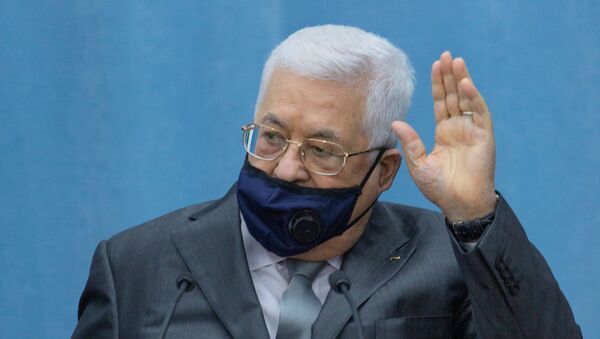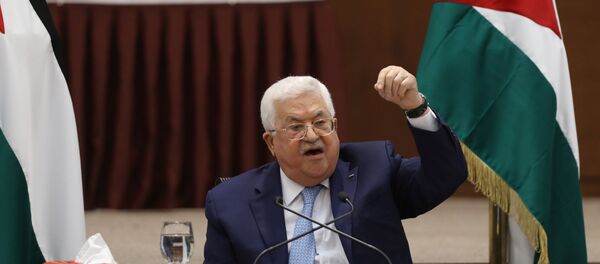Although sources close to the Palestinian leader told Israel Hayom newspaper that the intentions of the leader to end all cooperation with Israel and the US were "serious", they also stated that his assertion was mostly declarative and George Jaqman, Director of the Ramallah-based Institute for Democratic Studies, believes it is unlikely that Mahmoud Abbas will go ahead with the move.
Abbas Cries Wolf Again
"He can say whatever he wants in the media but the truth is that we simply don't know whether Abbas has a strategic plan to implement his declaration. We will only believe it if we see its practical implementation on the ground," Jagman explained.
However, that might prove a difficult task. Since the establishment of the Palestinian Authority in 1993, Ramallah has cooperated with Tel Aviv on various levels, including that of security, helping the Jewish state thwart major terrorist attacks.
But the security cooperation has also helped the PA. In recent years, Hamas, which has been competing with Abbas' Fatah, has stepped up its efforts to challenge the Palestinian leadership, planning attacks on their security personnel.
According to reports, the Palestinian leader's life has also been in danger "at least twice" with Israel's inner spy agency the Shin Bet helping Ramallah to foil his assassination and keep the militants of Hamas and other extremist groups in check.
That's why, believes the expert, Abbas' declaration -- that has been used on a multiple occasions in the past but has never materialised -- is merely aimed at giving "a green light" to the Palestinians, urging them to take to the streets and clash with Israelis, hoping that the escalation of tensions would force Israel to back down from its plans to incorporate more West Bank territory.
Back to Armed Struggle?
According to a recent poll conducted by the Palestinian Centre for Policy and Survey Research, 94 percent of Palestinians expressed their strong rejection of the peace plan rolled by US President Donald Trump in January, that presupposed major land swaps and the extension of Israel's sovereignty over predominantly Palestinian areas.
The same survey found that 77 percent of respondents were supportive of the idea of ending the PA's security cooperation with Israel, whereas 64 percent said they were in favour of resorting to an armed struggle to force Tel Aviv to scrap its expansion plans.
For Jaqman, however, attempts to drive the Palestinians out to the streets are "not realistic" simply because the reality on the ground has changed, he believes.
"In the past, Palestinians were able to clash with Israeli soldiers face to face because Israel's security personnel was positioned inside Palestinian towns, whereas now they opt to stay on the outskirts of cities which makes it more difficult for the Palestinians to reach and confront them."
To minimise losses, Israel has also erected a fence separating its territories from the Palestinians. The 708 kilometre-long barrier -- constructed in the wake of the Second Intifada (2000-2005) -- has managed to significantly decrease the number of Palestinian infiltrations, putting an end to a wave of terror attacks that engulfed the country in the early 2000s.
However, the implementation of security measures is far from the only factor that keeps Palestinians at home, says the pundit. In March, when the first coronavirus cases started popping up, the PA implemented a series of strict measures including a full lockdown of towns and cities to contain the spread of the pandemic, thus bringing the interaction between the Palestinian crowds and Israeli security forces to a minimum.
"Add this to the fact that the economic situation in the West Bank has deteriorated and you will understand why people will choose to refrain from an armed struggle despite polls that show overwhelming support for these tactics," explained Jaqman.
"The key for solving the problem and preventing Israel from going ahead with its plans lies within the Palestinian leadership, not the masses. It is only them who can stop Tel Aviv's intentions," he added.
Prime Minister Benjamin Netanyahu plans to hold a vote on the bill extending sovereignty over the Jordan Valley, that makes up some 30 percent of the predominantly Palestinian West Bank, in early July.
The bill will need to pass three readings before it becomes a law. If it does, the practical meaning of that would be that Israel will not only absorb some 65 thousand Palestinians who live in the area but will also gain full control over an agriculturally important piece of land which is considered pivotal for the economy of an independent Palestinian state.
Sovereignty over this area will also mean that Israel now needs to go through a long and bureaucratic procedure to approve construction and will be able to shorten these processes, enabling a relatively quick Jewish expansion.


